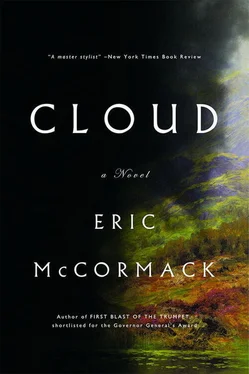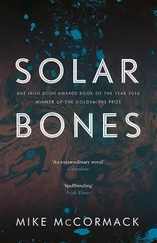The pride of the Old Town was its cathedral. It had been built by the Spaniards in the 1580s to let the vanquished Maya know that a European god was now in charge. In fact, a tourist brochure said that the cathedral stood on the very ruins of a temple erected by the Maya, centuries before, to celebrate a massacre of the Aztec. Some materials from the temple had even been used to build the cathedral. After reading that, I thought I could make out the faces of pagan deities, peering helplessly from inside some of the big stones.
The old temple had also supplied the cathedral’s massive wooden door, a door that was, according to a plaque beside it, considered miraculous. Apparently the wood was of a rare species, so dense that the conquistadores’ efforts to incinerate it actually made it tougher.
THOSE WERE THE kinds of impressions of La Verdad I rambled on about to the curator.
He asked an occasional question for clarification — I could hear him scribbling notes. Finally, he thanked me for the information.
“You never know,” he said. “Perhaps there’s some connection between La Verdad and Duncairn. At any rate, I’ll contact the city authorities. There may be records in some vault that would be of interest.”
That was fairly well the gist of our conversation, though he did mention my donation once again.
“On behalf of the Board of Trustees, I want to thank you very much. We work on a tight budget, as you can imagine,” he said. “If you do happen to be in Glasgow one of these days in the course of your travels, you’d be very welcome to drop by. You could see the kind of thing that goes on at the Rare Book Room and I could give you a verbal report on the current status of our research into The Obsidian Cloud .”
I assured him that such a trip to Scotland at this time was unthinkable — we were right in the thick of the busy season at Smith’s Pumps. That, of course, wasn’t quite the truth. How could I tell him that, above everything, two memories had always made me shudder at the idea of a return to Scotland: one concerned a bombing, the other a broken heart.
SO IT WAS THAT at the age of twenty-five, I married Alicia Smith. Gordon’s dislike of “public displays” was more than reason enough for us to hold the marriage ceremony in the Camberloo Registry Office, with only Gordon himself and Jonson present as guests and witnesses.
The wedding reception was equally small — just the four of us. Alicia had reserved one of the little enclosed dining areas upstairs at the Hanging Gardens Tavern in the village of St. Herbert, just north of Camberloo. She and I had sometimes gone there for lunch and enjoyed the antique atmosphere. The interior was wood-panelled, with bare roof beams and heavy oak furniture.
But it was the exterior that delighted Alicia most. The three-storey-high front wall was clothed in ivy. During the summer months, from little alcoves amongst the vines, hundreds of flowering plants and flowers protruded. When they were in full bloom, the wall looked like a perpendicular garden, or a marvellous painting. Presumably that was how the name The Hanging Gardens came about.
Though a piece of local folklore gave an alternative explanation. According to it, one of the nineteenth-century builders of the tavern hanged himself from a roof beam because of a failed love affair.
I liked that version, but Alicia, being Alicia, never gave any credence to it. I think she really doubted that human beings could be soft-hearted enough to kill themselves for love.
Our honeymoon consisted of a week at a remote, luxurious inn amongst the Muskoka lakes, a couple of hundred miles to the north of Camberloo. It was late September, so in that region the leaves of the deciduous trees were already changing colour.
On our return to Camberloo, I was permanently installed in the Smith household. Gordon gave up the main bedroom, which was actually a two-room suite with its own huge bathroom, to Alicia and me. He took over what had been her bedroom.
Otherwise, my presence seemed not to disturb in any major way the customary rhythms of the Smiths’ existence. Not that they had to go much out of their way to absorb me into their routine, for I tried to make myself, as much as possible, a seamless fit. On weekday mornings while Alicia slept on, I’d join Gordon in the kitchen for breakfast. We’d have toast and coffee, and skim through the newspapers without much talk. The limo would pick us up at eight-thirty.
My typical workday, as before the marriage, was spent at the office, where Gordon instructed me further in the art of sales. Occasionally I’d go to the factory. There, Lew Jonson would patiently explain the more subtle aspects of pumps and ventilators (p’s and v’s, as I learned to call them).
After work, our routines were quite fixed. At six-thirty, Gordon, Alicia, and I (and, occasionally, Jonson) would assemble in the dining room and await the serving of dinner. For the first time in my life, I learned to experience food as a sensual delight in itself and not, as in the Tollgate, simply the way of staving off hunger. I came to marvel at mouth-watering smells and flavours so refined I often didn’t know whether I was eating fish, lamb, poultry, or beef.
When the meal was over, we’d all head to the library for coffee and brandy and the men would smoke cigars. We’d talk about this and that, or we’d read quietly. We were all comfortable with each other. At ten o’clock, Gordon would say his goodnights and adjourn to his room (if Jonson had come for dinner, he’d already have left). Shortly thereafter, Alicia and I would go upstairs. She’d take her nightly bath — her second of the day, for she always liked to have a bath in the early afternoon, too — while I’d read in bed, waiting for her.
She’d eventually come to me all soft and perfumed with rosewater. By midnight we’d be asleep in each other’s arms. Often, when we woke in the mornings, I’d tell her about particularly interesting dreams I’d had. She’d lie there, half asleep, listening. As for her own dreams, she said she rarely remembered them but that, when she did, they were too unpleasant to talk about.
I didn’t press her.
DURING THE DAY, when Gordon and I were gone, Alicia was busy in her own way. She didn’t cook or do housework, but she did advise the maid, whose duties these were, on possible menus for dinner and on special cleaning tasks. Then there was the gardener to be dealt with, and so on.
Several mornings a week, as a member of the acquisitions committee at the art gallery, she’d visit local artists’ studios in search of potential exhibits. Being the daughter of a successful citizen of Camberloo, she also sat on the boards of St. Polycarp’s Hospital and of the Camberloo Symphony. These obligations involved fund-raising activities which kept her occupied.
Her membership in the symphony board surprised me a little. I’d never heard her or Gordon humming or whistling a tune, the way my parents used to. Apart from the night Alicia had put on a record when Gordon left for Montreal, music was rarely heard around the house. They’d both listen to the news on the radio, but if music came on, one or the other of them would switch it off as though tidying something up.
IN FACT, they often may have put me in the category of an untidiness. They made a fuss — though in a good-humoured way — over replacing my books in exactly their proper spots on the shelves, adjusting the cushions on chairs I’d been sitting on, or lining up my discarded shoes neatly on the doormat beside their own.
Eventually, I got the hang of it. But from time to time I’d leave something out of place, just to give them a chance to put it back where it ought to be.
Читать дальше











